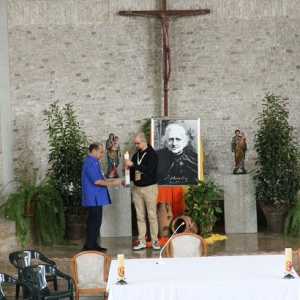Peter MALONE
My Big Fat Greek Wedding 3
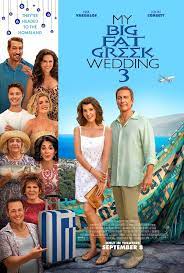
MY BIG FAT GREEK WEDDING 3
US, 2023, 92 minutes, Colour.
Nia Vardalos, John Corbett, Louis Mandylor, Elena Kampouris, Lainie Kazan, Andrea Martin, Gia Carides, Elias Kacavas, Maria Vacratsis.
Directed by Nia Vardalos.
And, why not? Except that this is a rather moderately fat Greek-Syrian wedding on the island of Corfu, happy celebration, but not the central event. Rather, this is a family expedition back to Greece, Tula, Ian, Louis, the aunts and the next generation going back to the village where their father came from. He has now died – and the film opens with a great deal of nostalgia, some scenes from the first two Big Fat Greek Wedding is (the first in 2003, the second in 2016) and a great number of photos reminding us of the presence of Michael Constantine, the restaurant, and his let initial laments about Tula and her marrying Ian. Lanie Kazan has a cameo role as the mother who is in and out of memory loss but gives the expedition her blessing.
As before, this is a raucous Greek comedy, in which any introvert could not survive! It is all loud, everyone in on the action, singing and dancing, arguments and reconciliations, and the importance of family, near cousins, distant cousins, and everybody included.
This film has been written and directed by Neo Vada le’s resuming her role as Tula, the anchor in the family, happily married to Ian, John Corbett again, for 20 years, having to pick up after her brother, Nick, Louis Amanda law who gets into all kinds of oddball situations but has the great desire to bring his father’s ashes to Greece and fertilise a planet near the oldest tree on the island with the ashes.
There are allowed farewells at the airport in Chicago. There is initial chaos on the plane with aunt Ruler (Andrea Martin) wanting to take over as usual. It is quieter at Athens airport where they are overcome with the views of the city but have to drive on, under the care of the mayor of the town, victory, who is Jack of all trades and has organised the reunion. Tula and Ian’s daughter, Paris (Elena Kampouris) appeared in the second film but now, at college, has problems, breaking off with Aristotle who turns up at the airport to support Aunt Ruler.
More wonderful Greek island scenery. More family tangles. Tula has her father’s precious notebook which she intends to give to his three old friends from a photograph in their happy days. But, can they be found? Cousins to the rescue, flying from Chicago, on a variety of boats, visiting clubs, and, of course, success despite apprehensions that the whole thing will be a failure – except that they will have the consolation of the Greek-Syrian wedding.
All’s well that ends well even if it emerges from raucous chaos. Some naysayers declared that this film was unnecessary. Well, may be, but the fans of big fat Greek wedding is will be eager to see it nonetheless. (And the romance of the next generation – obvious foundations for Wedding 4.)
- The popularity of the initial film, the sequel, anticipation of a further film? The characters, situations, weddings and families, the generations?
- Audience familiarity with the characters, their welcome return, expectations of how they will behave?
- The opening, the death of the father, the clips from the other films, the photos, Lanie Kazan in a cameo, the setting of the tone? The decision to go to Greece, to find their father’s village, the boys in the photo, Tula and her determination to find them and have a reunion?
- Tula and Ian, their marriage, their daughter, at college, her concealing her failures? Tula and her mother, memory loss, giving her blessing? Nick and the preparation for travelling? The fathers and?
- At the airport, Greek chaos and humour, farewells? On the plane, souvlaki, Ruler and her flirting? The attendant and control? Athens, Victory meeting them, their being overwhelmed by the views, the many, Tula driving, how to the countryside, finding the village, almost deserted?
- The encounter with the severe Dragon lady, her look, manner of speaking, turning up, frightening them? Her back story? Her gradually mellowing, the son, the Syrian refugee, permission for the marriage?
- Settling into the village, Victory taking charge of everything, all in the one room, Paris and Aristotle sneaking out, the club? Life in the town, the marketing and shopping, trying to find the old men, everybody offering them a drink, the effect on Tula? Going to the beach? Paris and the nude beach? Nick? The shower?
- Tula and Ian having a holiday and relaxing? The two aunts and their conversations? Paris and Aristotle, tensions, relaxing, bonding?
- Nick, the fathers and, measuring the age of the tree, the revelation of what he planned, the discussions with Tula, head of the family, fertilising the plants with the ashes? Shared responsibility for the family?
- Nicky and her husband, to find the three men, the flight, the boats, the clubs, making the contacts, and their arriving on the island?
- The wedding, the celebration, the Syrian refugee, the dancing?
- The arrival of the old men, the reunion, the celebration? Victory and her achievement?
- Audiences liking this family for more than 20 years? Relishing the Greek celebrations? Enjoying the comedy, the raucous touches, the sense of family?
Blue Beetle
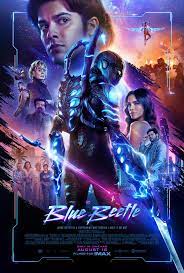
BLUE BEETLE
US, 2023, 127 minutes, Colour.
Xolo Mariduena, Adriana Barraza, George Lopez, Susan Sarandon, Bruna Marquezine, Becky G, Damian Alcazar, Belissa Escobedo, Elpidia Carillo, Harvey Guillen, Raoul Max Trujillo..
Directed by Angel Manel Soto.
Audiences who have enjoyed the movies from DC Comics, especially the more prominent with Batman, Superman, Justice League (and various combinations) but are not familiar with the comics, may not know Blue Beetle. But, checking indicates that he first appeared in comics form, in fact, as early as 1939 and has had two incarnations, referenced in this film, but now we see the Blue Beetle, 21st-century style, and he is Latino, Xolo Mariduena. And the film is very Latino in writing and sensibilities and indirection by Angel Manuel Soto..
We are in Palmara City, more than a touch of Florida atmosphere, and Jaime, early 20s, arrives back home after completing his college degree, only to find that his close family, mother, father, nana, sister Milagro, uncle Rudy, are about to lose their home. And they are being put out by the enormous Kord Corporation, taking over the city but with sinister intentions of taking over the world, absolute military power. And the CEO is none other than Susan Sarandon, absolutely ruthless, easily able to dispose of rivals and inconveniences. Except, that her niece, Jenny, daughter of a previous Blue Beetle, has a conscience and social concern.
We spend the early part of the film getting to know the family, the family bonds, the neighbourhood, and apart from Susan Sarandon and Jenny, the cast and characters are all Latino. Plenty of Latino ethos, family bonding, supporting jobs, plenty of humour, but Nana busy at her sewing machine and father having had a heart attack.
The screenplay seems plausible enough (actually plausible is not the right word for this kind of contrived scenario) for Jaime to become transformed into an unsuspecting superhero – lots of action and comedy in the painful change, rocket into the stratosphere and down again, tested bullet-proof…
Because Jaime has encountered niece Jenny and been attracted to her, he is ultra-willing to help her against her aunt.
So, lots of stunt work eventually, certainly a lot of confrontations between Blue Beetle and another transformed human-machine, urged to listen to his inner voice, experiencing upsets in the family but technical-geek Uncle Rudy to the rescue. And, wondering why Adriana Barraza as Nana gets such high billing, that question answered when she moves from the sewing machine to high-powered rifles remembering her revolutionary days!
In a way, it all goes as expected but is clearly geared to the young superhero fans demographic – perhaps a bit all too obvious for older fans. And it is more than clearly geared to the US Latino audiences and Latino audiences everywhere, reminders of their being Prest, migration from Central and South America, border walls and hostilities, difficulties of migration, documentation, employment, seeing themselves as impoverished second-class citizens.
In the end, with all the heroics (and, what a relief when the exclamation so often throughout the film is just “what the hell” instead of the other over frequently used expletive), Jenny now in charge and the family have ambitions to make America great again in the better sense – which means that it is highly unlikely that there will be screenings of Blue Beetle at Mar-a-Lago!
- DC comics and the film versions? Blue Beetle is lesser-known? The comics since 1939?
- Television intentions, cinema release, popularity?
- The Latin perspective on the film, characters and situations, US after the Trump era, cast, writer, director?
- A different superhero, origin story, reluctant, unaware? Transformation, becoming the Blue Beetle, the previous Beatles, Jenny is stealing the beetle, the box, in Jaime’s care, Milagro opening it, Jaime’s experience, his back, the scarab, wings, the inner voice? The testing, into the stratosphere, landing, bullets…?
- The background of the Cord company, origins, hopes for peace? Victoria, despising her brother, controlling her niece, building the Empire, the buildings, offices, interiors…? Transforming the man into a weapon? Is doing her will? The contrast with Sanchez, portly, the scientist?
- Jaime, the family, the various members, the bonds, at college, returning, the airport, the house, losing the house? The interactions, the father with your heart attack and recovery, the mother and her care, Nana and her sewing, uncle Rudy and his appearance, tech knowledge? Milagro and her teasing Jaime? The job, the Anglo characters, the swimming pool, Milagro using the toilet, Jaime overhearing the conversation, to rescue Jenny, the promise for the interview, going to the office, waiting, Jenny giving him the box?
- Victoria, her control, her manner, cruel, using people, the military? Press conferences? A voice-over at the offices? The plan for a single weapon? Gaining the beetle? It’s disappearing, setting her military to find it?
- The family, Jaime and’s experience, the threats, Rudy and his machines, the car, helping Jenny? The father, his heart attack, death, yet appearing to his son? Nana, the sewing machine, the heavy military artillery, her memories of revolution?
- The many fights, Jaime and the dangers, needing help from the others? Jenny taking him to the old house, the memories, her mother’s paintings, the superhero is? Getting everything to start up again? Rudy and his method of kicking machines to start them?
- Grow working with Jenny? Jenny welcomed into the family? Her being cut off, recovery, trapped by her aunt?
- Victoria, pleased at the transformation, but wanting her henchmen to get it back?
- The range of struggles, the special effects, the fights?
- Jaime listening to his inner voice, the voice of the Blue Beetle, urging him to listen to his inner self, listening to his father, two Rudy? Helping the henchmen with his memories, his realisation that Victoria had destroyed him? His destroying her?
- Jaime, trapped, Sanchez helping him? The final rescue?
- The aftermath, Jenny, the company, to make America great – and the contrast with the trump kind of language and ethos with the reality of oppression of Latinos in the US and getting into the US?
- The final credits and Jenny’s father making contact?
Cost, The

THE COST
Australia, 2022, 111 minutes, Colour.
Jordan Fraser-Trumbull, Damon Hunter, Kevin Dee, Clayton Watson, Nicole Pastor.
Directed by Matthew Holmes.
Looking at the poster for The Cost, reading the taglines to promote it, many audiences might well be put off, thinking, simply, here is another vigilante,and vengeance drama.
It is, but it is much more.
This is an Australian film but with universal themes. The early sequences take place in suburban Melbourne but the action then moves out into the Australian bush – and the photography captures the atmosphere and beauty, as well as some sinister undertones, of the Australian landscapes.
For the first 30 minutes of the film, the audience is introduced to three characters, seen in dramatic situations but no explanations offered. There is David (Jordan Fraser-Trumbull), youngish, going to the hardware store for his purchases. There is Aaron (Damon Hunter) a family man at home. And there is Troy (Kevin Dee), emerging from the factory, home alone, drinking and TV, going out to buy a sixpack..
This drama would work best with audiences knowing not much more about the plot and its developments. There is quite some tension, the background of the situation gradually emerging, brutal crime, prison, the effect of imprisonment, consequences for the relatives of the crime victim, anger (rage) and the issue of citizens taking it on their own responsibility to execute what they see as justice.
These themes have been taken up over the decades, issues of vigilante justice, especially in many American thrillers (think Clint Eastwood, Charles Bronson). But, The Cost is a very different kind of film. One might call it a film of moral probing.
And for the moral probing, it will depend on the attitudes and presuppositions of each member of the audience and whether they will identify readily with the vigilante theme or will find it, even though it is psychologically understandable, repellent. Writer-director, Matthew Holmes, has been quoted as saying he was intrigued by the situations of legal justice and vigilante justice and, with his co-writer, Gregory Moss, they created a drama of “what if…?”.
And, the dialogue provides opportunities for the audience to feel emotionally, to feel disgusted, to wonder about imposing justice with violence and actually lowering oneself to the level of the criminal. And, even with planning, is it possible to go through with actual vindictive vengeance? (It is interesting to note that Matthew Holmes previous film was The Legend of Ben Hall, intriguing in itself, the portrait of a bushranger in the 19th century Australian context of justice and injustice, exploring the bushranger mind and ethos amid beautifully filmed Australian landscapes.)
The film uses ordinary situations to create tension, stopping at a service station at night and a friendly truck driver, the police pulling the drivers up at night because of a faulty taillight and, more dramatically, a local farmer turning up interrupting the dramatic confrontations without realising it but eventually drawn into it as an innocent bystander, audiences than identifying with him, conscience and fear.
This is a very well written and directed film and excellent performances that make the behaviour of each character credible. Some audiences may dismiss it or just take it as another vengeance movie. For those who are willing to spend some time with it, even though it is tough going, it is a telling exploration of moral behaviour.
- Title? As it refers to each of the central characters? The crime, responsibility, punishment, vengeance?
- An Australian drama, universal themes? Filmed in Victoria, the suburbs and the streets, homes and interiors, on the road, service station, the countryside, the hopes? The authentic atmosphere? Musical score?
- The first 30 minutes establishing the characters: the glimpse of the dead girl, the focus on David, leaving home, the encounter with his friend, going to the hardware store, the collection, the friendly cashier? Aaron, at home, interactions with his wife, with his son, the loving wife, the son being petulant, his getting his gear, the rifle? The introduction to Troy, coming out of work, the workers, going home, the cat, living alone, watching TV, drinking, going to the shop, friendly? The audience wondering, suspicious?
- David and Aaron, the car, the masks, going into the house, darkness, confronting Troy, the torches, tying him up, the hood, bundling him away after the injection, in the boot? Driving away, at the service station, David and buying the drinks, Aaron filling the car, the pump, Troy making noise, Aaron hitting the car roof, the friendly driver and his bringing the coffee? They are stopping and giving Troy another injection?
- Pulled up by the police, audience tension, on their side or not, still wondering about the situation and responsibilities? Getting the light fixed, David opening the boot of the car, seeing the problem, their being warned, going off, arriving at the property, unlocking the gate, driving?
- The night passing, Aaron en garde, David sleeping, Troy on the ground?
- The day, the confrontation, the audience understanding what had happened, Troy, years earlier, the attack on David’s wife, in the suburbs, the street, abducting her, tying her up, the rape, killing her? David in the flashback to the phone call from his wife? And his later regret that they had quarrelled and he had not time to apologise, yet her love on the phone call?
- The confrontation, the kind of kangaroo court, private vigilante approach, judgement already made, punishment decided? Both Aaron and David involved, their plan? Whipping Troy? Telling him not to plead? The attack, on his face, the blood?
- Audience attitude towards Troy, young, irresponsible, predator, brutal? Pleading guilty, 10 years in jail, his comment about being raped, the guards ignoring this? Behaviour in jail, early release? Having served his time? His life alone, his conscience?
- David and his wife, Aaron and his sister, their anger, the trial, anger at Troy’s early release? The plan, preparing everything, the rifle, the location? Audience judgement on them, empathising with their anger, questioning what they were doing, going to Troy’s brutal level?
- The dialogue in the film, the writer-director and his creating a what if situation? Both sides of the issue, Aaron as implacable, David and the difficulty of actually facing Troy, whipping him, verbal abuse, yet realising that they were going to Troy’s level? The exploration of David’s attitudes, anger, vulnerability, but doubts about killing Troy?
- The arrival of Brian, genial, explanations, their helping him with repairs, sitting by the fire and drinking? The discussion about fishing?
- Leaving Troy, his getting loose, moving through the bush, the tracking him down?
- Brian, going to be shed, Troy moving through the bush, on his feet, the two searching for him, driving in the opposite direction, turning round, Troy and his going through the property, going to the shed, Brian?
- David and Aaron and the pursuit, David and the encounter with Troy, the rifle, turning the tables, Troy with the rock, not killing David? The effect on David, not able to kill Troy, yet wanting to protect the two of them, the consequences of their actions, desperation? In the background digging the grave?
- Brian, his fears, trying to persuade Aaron not to shoot Troy? The tension, the innocent bystander, caught up? The horror of Aaron actually shooting Troy? Brian, fears, escape, his being pursued through the fields?
- Troy’s body, the grave, all the equipment, set on fire? They going home?
- The film ending, the audience and the moral probings of the issues, conscience, crime and punishment, atonement, vengeance, violence? And the audience speculating as to what would happen, personally, legally, consequences?
Stylebender
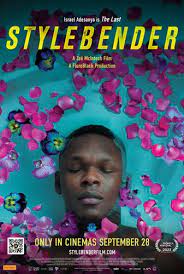
STYLEBENDER
New Zealand, 2023, 102 minutes, Colour.
Directed by Zoe McIntosh.
Who is Israel Adesanya? Well, he is the subject of this film. But, who is he? And why is there a film about him?
Ardent fans of mixed martial arts and kickboxing would be able to tell you about this champion at a young age and continuing as a recordholder. And, these fans (and various sequences here show large auditoriums and arenas with thousands of fans) will be the first to line up to support Stylebender, Israel’s chosen professional title.
Which may mean that those who are not fans of mixed martial arts and kickboxing, and they are many as well, will not be lining up to see this portrait of Stylebender.
But, it may well be worth their while. There are MMA scenes, various bouts, championships, but the ardent fans made disappointed that there are not more. Which means that there is much more going on in the story – an opportunity to reflect on not just sports themes and competitiveness but rather what drives a potential champion, hopes and ambitions, support of family and trainers, self-image, self-questioning…
Israel Adesanya was born in Nigeria, one of five children, teaching father, nursing mother, moving to Ghana but deciding to migrate to New Zealand for the sake of the children’s education, settling in Rotorua, Israel educated there, not so much interested in sports, beginning tertiary studies, fascinated by Japanese anime, but moving into boxing and away from studies, into the world of MMA.
The director of this film, Zoe McIntosh began her three years following Stylebender knowing nothing about MMA, but watching, greater understanding of intricacies, interested in Israel’s character, his revelation of self-questioning, a more gentle part of his personality, but his competitiveness, his comments about his family but their support of him, often present at bouts, and his strong relationship with his long-time coach, Eugene Bareman. Dance is important, rhythm and movement. Exercise and fitness.
In fact, Israel is an eager interviewee, and an often fascinating talking head, a man who has explored his masculinity in the context of martial arts sports and their image, who has grown in self-confidence (and looking at him, listening to him, echoes of the bravado of Mohammed Ali). And, quite a number of interviews with the congenial Eugene Bareman to complement Israel’s opinions.
So, while this can be described as a sports film, it is rather a documentary portrait of a complex character, African background, New Zealand education, experience of bullying, and life choice for career, pride as well as questioning, achievement and its consequences, competitiveness and rivalry, his mark made in his chosen sport – but, his age at the time of the release of the film, 33, life still before him.
(For those who would like more information, the Google entry is extensive.)
Stranezza/ Strangeness
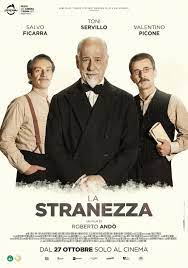
STRANEZZA
Italy, 2022, 104 minutes, Colour.
Toni Servillo, Salvatore Ficarra, Valentino Picone, Luigi lo Cascio.
Directed by Roberto Ando.
A mainstream audience may find the strangeness of this story difficult to enjoy – and, sometimes, to follow. However, it is a film very much for an Italian audience – but also for an audience interested in theatre, the history of theatre, Italian theatre and the playwright and author, Nobel Prize for Literature, Luigi Pirandello.
The setting is 1924, a visit by Pirandello to his home city in Sicily, Agrigento. His nanny from the past has died and he wants to be present for the funeral. But, this is Italy, this is Sicily. There is bureaucracy, mislaid papers, delays – all leading to the presentation of a bribe. Atmosphere of southern Italy! (And beyond.)
The two men involved in the funeral arrangements and grave digging other comedy duo of Salvatore Ficarra and Valentino Picone. Different in appearance, and styles of speaking, they are an expert duo in contrasts. But, not only do they do the funeral arrangements, they are putting on the play in the local theatre, writing, producing, acting. Pirandello is invited to the performance. There are glimpses of rehearsals, the local amateur actors and their eccentricities, and then the performance. Pirandello is in a box, somewhat detached, but amused. The audience participates, often and loudly. And part of the performance is a satire on the money-grabbing bureaucrat and his relationships, denounced by his wife from the audience.
While the funeral eventually proceeds, Pirandello returns to Rome and draws on the Sicilian experience for his classic play, Six Characters in Search of an Author. The two Sicilians have been invited to Rome, an exciting train expedition, amazed at the city, the theatre, puzzled by the performance. However, the new player has drawn very much on Pirandello’s Sicilian experience and the characters. The play is denounced, booing from the audience, projectiles. However, there is also acclaim for it and it becomes a classic and, in 1934, Pirandello wins the Nobel Prize.
- The title, the focus on the life and work of Luigi Pirandello, his approach to life, to literature, to drama, his experiences of strangeness?
- The setting, the 1920s, the era of fascism, life in Sicily, in the city of Agrigento? The local people, families, workers, funeral arrangements and grave digging…? Pirandello theatre, participation and enjoyment? The authorities, finance and bribes? Satire against them?
- Audience knowledge of Pirandello, his background, his literary achievement, the 1934 Nobel Prize for literature? His personality, observations of characters and life?
- The status of his play, Six Characters in Search of an Author? The initial hostile reception? Its status as a classic? This film speculating on its origins and development?
- The presence of Tony Servillo as Pirandello, his status, arrival back in Sicily, the death of his nanny, wanting to be at the funeral? The situation with the arrangements, the delay, his staying, connections with people in the city? The discussions with the gravediggers? The invitation to the theatre? His sitting in the box, observing, sometimes amused, interested in the characters, the repartee, the political satire, the audience response? The variety of the cast and what they represented, deadlines, delivery? His creative response?
- The two men working for funerals, grave digging, the casting of the comedy duo, their interactions, repartee, clashes? At work, the demands of the arrangements, the funerals, the graves? Bureaucracy, delays, paperwork, bribes? And Pirandello agreeing to this?
- The theatre, writing the lines, performance, the friendships, the rivalries, relationships, actresses, marriage, the bureaucrat in the audience and his affair, his wife…?
- The usual aspects of “putting on the show”, difficulties, the actors, people remembering their lines, the actor with one line and his declaring it, the actor and his dressing as a woman, performance, the issues of the play, reflecting life in the city?
- The participation of the audience, delight, laughter, reactions, satire on the bureaucrat…?
- The range of personalities of the actors, their self-image, presence on stage, performance, range of actors?
- Pirandello, his play, the funeral directors on their travel, the invitation, their being overwhelmed, puzzled by the theatre, the performance of the play?
- The performance, mirroring the Sicilian experience, the characters, the dialogue, the nature of the characters and the plot, their search – and Pirandello as the author? The hostile audience response, catcalls, projectiles…? Those in favour?
- The touches of realism, the atmosphere of surrealism, memories of Italian theatre in the early 20th century, audiences, and the status of Pirandello?
Cerchio, Il/ The Circle
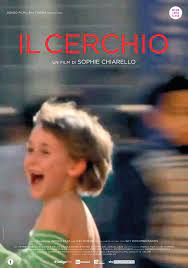
IL CERCHIO/THE CIRCLE
Italy, 2022, 108 minutes, Colour.
Directed by Sophie Chiarello.
This is a significant documentary about primary school children. It was filmed over a period of five years, beginning when the children at the centre of the film were five and six, moving through each year until they came to the end of the primary school period, aged eleven to twelve.
This is a film very much for parents and teachers, an opportunity to listen to the children, the issues they raise, their interactions with one another, the growing sense of responsibility… But the film would also be very interesting to children, for parents and teachers to gauge the children’s response, empathies, critiques.
The film was made in Rome in a multi-cultural, multi-ethnic neighbourhood. Some of the children remain at the same school over the period of the five years, while others come to the school after being bullied at another school, and some are the children of migrants.
And the title? The basic idea is for the children to meet regularly, supervised by the teacher, but not in a formal classroom situation, a free circle where topics are raised, questions asked by the teacher but the camera not on the teacher, an opportunity for children to act their age. The camera is firmly focused on the children, a great number of close-ups, extreme close-ups of faces, gathering the range of expressions, spontaneous responses.
Parents and teachers may not be surprised at the topics that are raised, many indicating a surprising degree of sophistication, of reflection, of articulation, of interaction. Audiences who see the film and are not directly involved in primary school education may be very surprised at how the children react. Generally, they sound like children, but the words and discussions are sometimes surprisingly wise, often have some depth, lead to a greater awareness of persons and issues, a greater sense of responsibility.
This is just one example, from Italy in the 2010s, and any parallel version of The Circle would be welcomed.
Oink
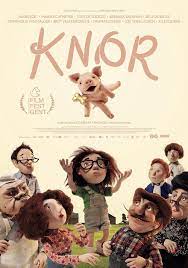
KNORR/ OINK
Netherlands, 2022, 72 minutes, Colour.
Directed by Mascha Halberstad.
Once upon a time, almost 30 years ago, audiences fell in love with a pig, Babe. Then there was a sequel, Babe in the City. This time we have Babe in the Netherlands.
Knorr/Oink runs for 72 minutes, a brief enough time for youngsters to sit through the film. It is very much a film for youngsters, perhaps younger rather than older, who can identify with the main characters, nine-year-old Babs and her neighbour, Tijn. We might remember that the impact of Babe in the 1990s was that a lot of young audiences were definitely put off eating meat, the horror of thinking about eating Babe. But, this was only a temporary conversion to a vegetarian perspective. And, it will probably be the same with Oink, though there is quite some dialogue about the horror of eating meat.
The film opens with a young TV commentator introducing the sausage making competition in the town, two rival butchers, getting rather violent as the proceedings continue, the judges expelling them for 25 years. Now the 25 years have passed.
Babs, bespectacled and forthright, does have some BRITISH behaviour. Tijn is better behaved. They both practice their cooking in the shed adjacent to the family home. Mother is very busy, father is continually doing crossword puzzles. Then an old man, looking like a refugee from a cowboy film, arrives home, the old grandfather from the sausage competition 25 years earlier. He seems very agreeable, TIjn discovering his mincing machine in his luggage and the grandfather showing how it works with vegetable sausages. Peace at the vegetarian table.
Babs gets a pet pig, Oink, very playful. She takes into a dog training school where he is a failure, not seeming to comprehend “sit” or “stay”. But, when Babs offers him treats, obedience personified. He does not perform well at the dog tests – but wins over everyone when he behaves well for love of Babs!
This is the first stop-motion animated film made in the Netherlands – very labour-intensive in the making, but the characters are limited in expression to movements of the eyes, the mouth, the nods of the head. So, very simple animation.
But, the competition is on again and there is the compere from 25 years earlier, still enthusiastic, but a great loss of hair!
Of course, we realise (some sooner, some later) that grandfather is there for the competition, especially rivalling the butcher who is still operating in the town. This leads to all kinds of adventures, pursuits, grandfather kidnapping Or ink, mother and father, rather tough aunt (grandfather’s sister), Babs, Tijn and a tractor driver all in pursuit.
Now, a challenge for the reviewer, of how to put this appropriately and delicately. Oink is prone to exceeding wind and splashing poop all over the place. Even in the grinder which turns out…! Of course, this is key to the final competition where the vegetarian message seems to be, rather graphically, “Eat ****… (The classification is PG with the alert that there is some crude humour!) We can say that humour in the Netherlands is down-to-earth and robust!
Our General Chapter, Reports
Our General Chapter, Reports
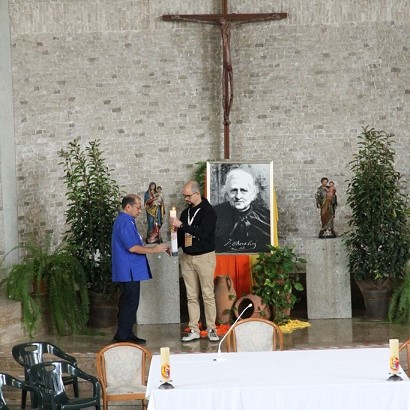
The Chapter website is posting daily reports and extensive photos by Javier Traperoi. We will continue to post reports as they come to hand.
We are on the lookout for our Australian delegates in action!
First Day. 18th September by Javier Trapero
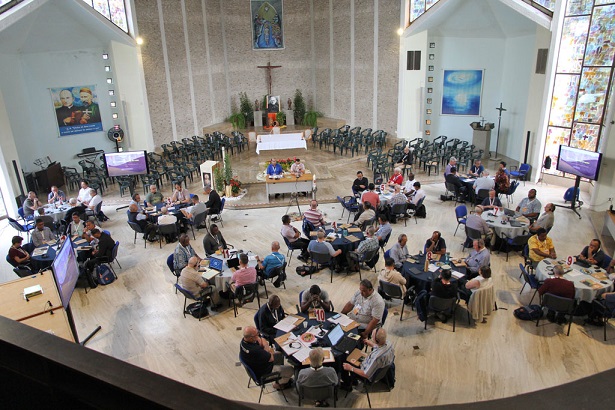
The day began with the same fraternity with which the Opening Mass of the General Chapter was celebrated the day before. The first session was a time for community prayer that took place in this relaxed atmosphere. Fr. Humberto Henriques, msc, as he did in the online sessions for the preparation of this General Chapter, reminded us that the process is a continuous prayer inspired by the Holy Spirit. Fr. Humberto lead the opening meditation with the recitation of the General Chapter prayer.
In this opening session, the formal business of the Chapter was enacted. Fr. Abzalón Alvarado, msc, proposed the members of the different commissions and sought the approval of the Chapter. All matters were approved unanimously:
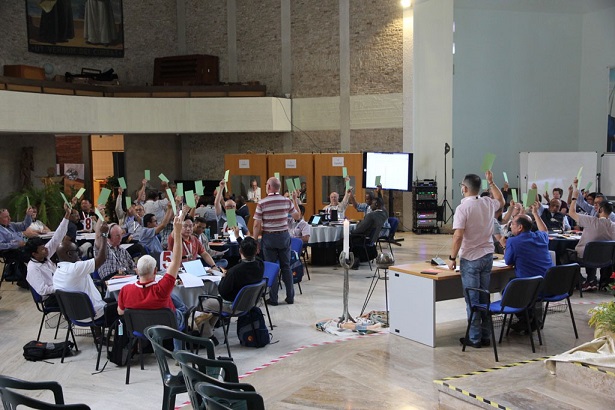
- Internal Rules of Procedures for the functioning of the General Chapter.
- Appointment of officers.
- Facilitators: Br. Joe McKee FMS, Mrs. Frances Heery
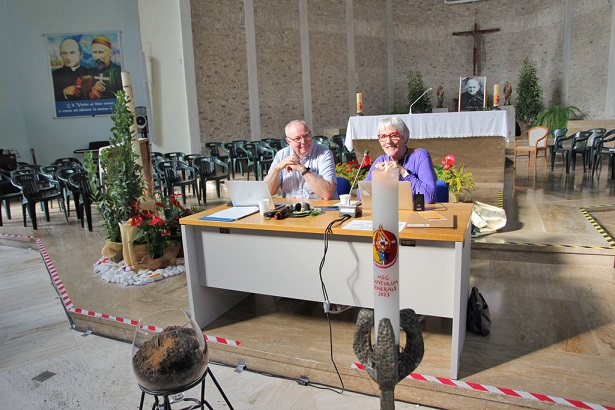
- Scrutineers: Clement Sathish, Jenner Kihoulie, Daniel Paiva Martins
- General Secretary of the Chapter: Fernando Clemente and the other members of the secretariat, Steve Boland, Alan Neville
- Simultaneous translators: Sr. Nicola Sprenger, msc, Sr. Régina Kahindo Bahwere SF, Mr. Nate Bacon, and Celestin Bela MSC.
- Logistics: Richard Suresh, and Ms. Sophia Amante
- Liturgy: Pablo da O. Moura
- Decoration: Myke Decalos
- Communication: Mr. Jarvier Trapero
- Steering Committee: John Mulrooney, Michael Huber, Abzalón Alvarado, Fernando Clemente, Ms. Frances Heery, Br. Joe McKee, FMS.
The members of the commissions were then proposed and elected:
- Juridical Commission: Tim Brennan, Ton Zwart, James Espuerta
- Redaction Commission: Carl Tranter, Stephen Hackett, Raymond Lièvre, Hugo Londoño
The day before, Abzalón said that the person’s present here have been elected in each province by their confreres as delegates. We are a Congregation and a small representation is gathered here of a large fraternal community. Therefore, the following commission has a special importance because its mission is to promote a fraternal, friendly and family atmosphere.
- ‘Gaudeamus’ Commission: Richard Kim, Jommy Burgos, Yvon Banackissa, Luis Carlos.
Chris Chaplin, msc, explained how the sessions would use different documents to be displayed on the different screens in the Chapter Hall and how the Chapter website can be accessed as a working tool.

During the Chapter the facilitators will help us to begin to deepen the discernment process. Joe and Frances proposed a personal reflection and then in groups on the experience of community wisdom. We are in a change of epoch, a time of synodality, and of working from communal wisdom. Also, it is a time to listen to what the Holy Spirit saying to us. Listening is an attitude that has to dominate all of what we do during these days. Another attitude is to share with one another what we hear and respect what other confreres propose. All this leads to the path from Ego to Eco. Prayer is essential in the whole process, connecting with the Spirit of God and being united to the Heart of Jesus.
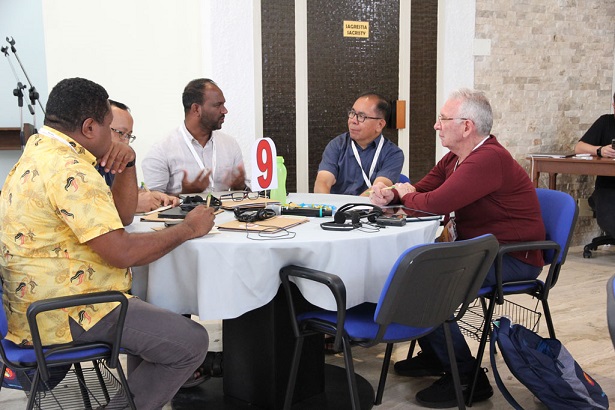
To foster this prayerful atmosphere, times for communal prayer will take place each morning, beginning in the Worship space of the Chapter Hall and then moving to small communal wisdom sharing groups later in smaller rooms. Fr. Chris explained how these times of prayer are organized in groups.
This concluded the morning session.
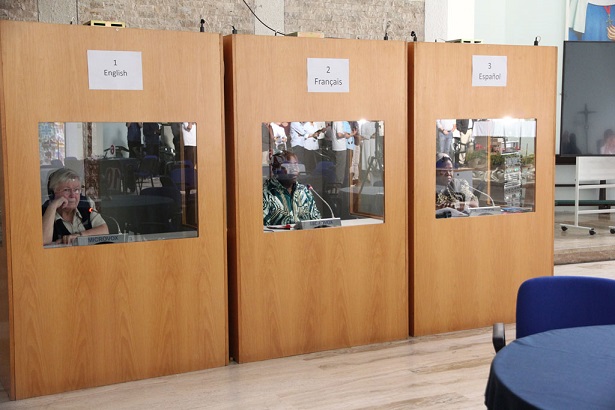
In the afternoon, the facilitators, Joe McKee and Frances Heery, conducted a session of internalization and awareness of what this Chapter means for each of the capitulants personally and for all the MSC.
At the end of the session, Frances spoke about the VUCA model (Volatility – Uncertainty – Complexity – Ambiguity), a vision of society that we can combat and reverse as Christians by changing the meaning of the acronym VUCA with the concepts (Vision – Understanding – Compassion – Audacity).
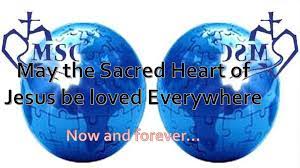
The day concluded with a Mass presided over by Fr. Daniel Auguié.
Our Chapter – opening Mass, and from Abzalon’s homily
Our Chapter – opening Mass, and from Abzalon’s homily
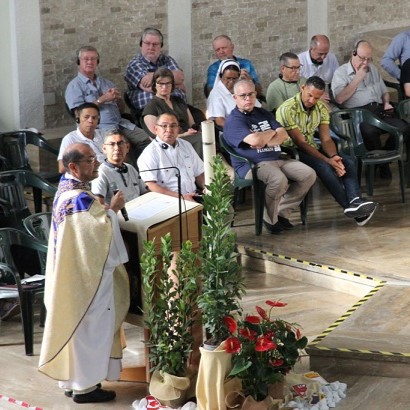
Some pictures of the Mass – and if you look closely, you will find Stephen Hackett, John Mulrooney, Tim Brennan and, invited to the Chapter, Alison McKenzie. And Chris Chaplin with the General Councillors.
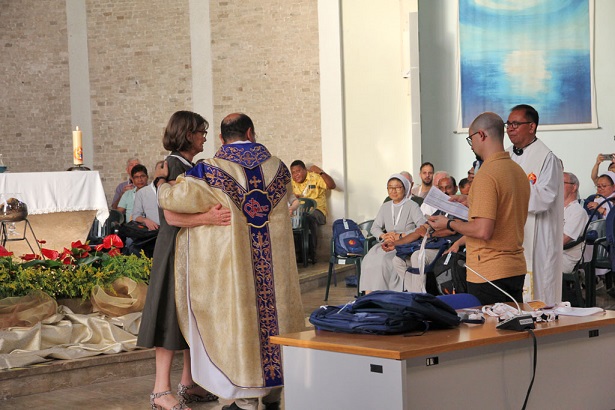
From the Homily
There is no point in counting forgiveness. Whoever starts counting how many times he/she forgives his brother goes down an absurd path that ruins the Spirit that must reign among those who follow Jesus.
In the face of a culture of vengeance without limits, Jesus proposes forgiveness without limits. We urgently need witnesses of Jesus who proclaim His Gospel with firm words and spread His peace with humble hearts—believers who live by forgiving and healing this unhealthy obstinacy of rivalries and revenge that has penetrated His Church.
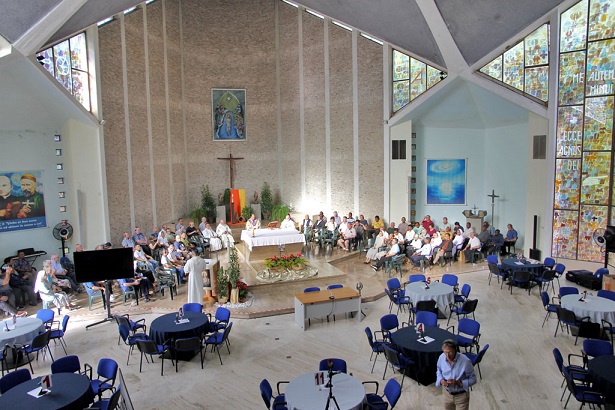
Based on this evangelical invitation, which is to love ALL without measure and from our Spirituality of the Heart, during these six years we have tried,
- To develop a shared leadership according to the Spirituality of the Heart.
- To update the structures of our Society to better respond to the needs of our mission in a changing world.
- Promote and accompany congregational solidarity and the equitable sharing of the means of our Congregation, thus supporting the first steps of what will become the MSC Foundation.
- To commit ourselves to the promotion of Safeguarding Culture and integrity in ministry.
- Renew our MSC Spirit, seeking to transform clericalist and mediocre mentalities and attitudes towards commitment to JPIC and solidarity with those excluded and marginalized, such as refugees, migrants, and other areas of exclusion.
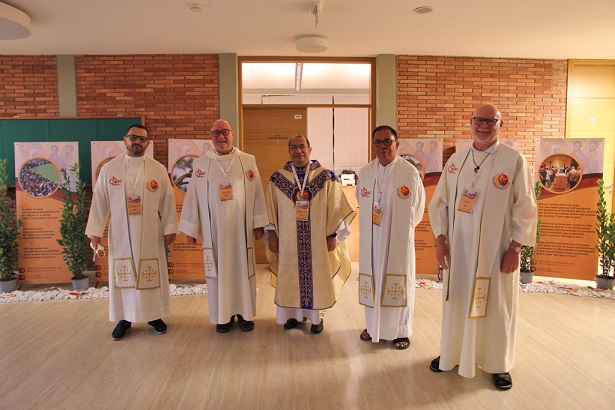
In commending our Chapter to a Mayan indigenous leader from Guatemala, he wrote me the fruit of his contemplation and prayer, and I share it with you today because, through the reflection of this Mayan leader, I feel that the Spirit is inviting us to become aware:
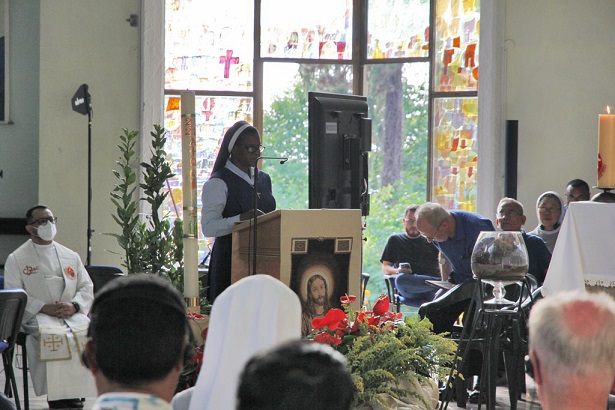
The Mayan indigenous leader said to me:
- There are many unresolved problems and difficulties trampling on the congregational journey.
- The health of our communities, in terms of community and generational relationships, is suffering from imbalances.
- The spirituality that characterizes us as a community needs to revitalize its roots from its originality.
- The Chapter is a time to allow ourselves to be shaken up so that new air can enter.
- As the Pope said in Portugal, we must deepen our relationships with ALL.
- We are called to weave new strategies of fraternal dialogue, and the quality of community life depends on the quality of our conversations.
- We are called to discern and seek remedies to heal unhealthy situations and solutions to the problems that distance us from the kingdom of God.
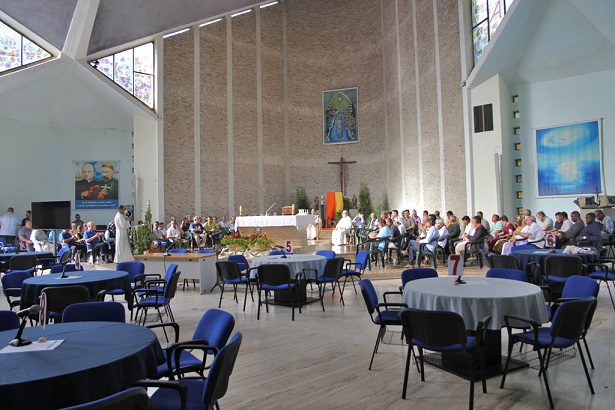
Brothers and Sisters, the theme of this Chapter is “Did not our hearts burn within us, as we walked along together“. It reminds us that this journey started in 1854 when Fr Chevalier began to feel his heart burning for the mission. It has continued to burn for 168 years. In the last six years, this journey has flowed in synodality and interconnectedness through the General Conferences of 2019 and 2021, the accompaniments carried out, the provincial activities and meetings, as well as the international encounters undertook.
Let’s make this time an opportunity for deep listening, freedom, and courage to believe in the process, trust the guidance of our facilitators, and, thus, build together an actual MSC ecosystem.
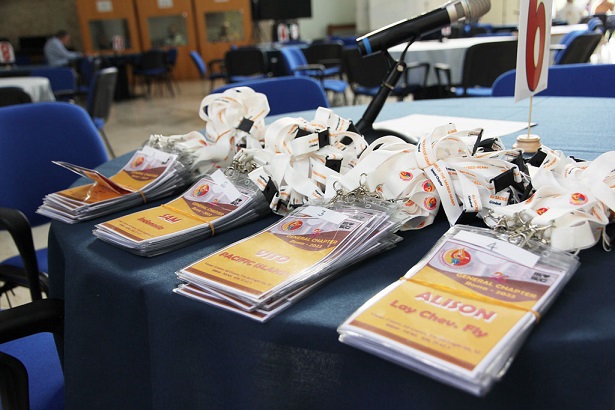
May Our Lady of the Sacred Heart help us so that we may create participative processes and deep and empathetic conversations during these three weeks of the Chapter Assembly.
Welcome to all, and we, as a result of this, declare the opening of our 26th General Chapter.
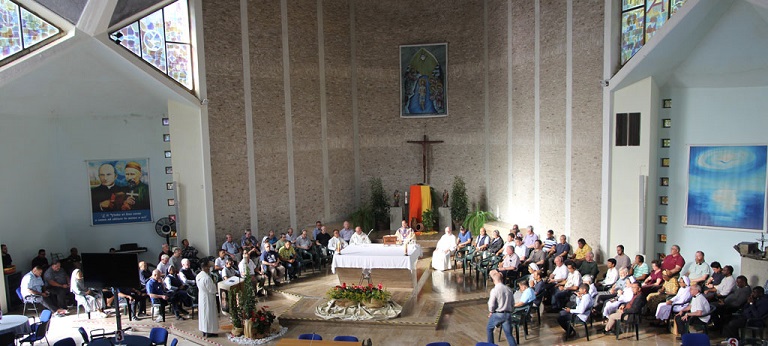
Scrapper
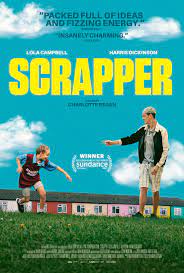
SCRAPPER
UK, 2023, 84 minutes, Colour.
Lola Campbell, Harris Dickinson, Alin Uzun.
Directed by Charlotte Regan.
Here is a pleasing slice of life in East London. It is a small film, running under 90 minutes, but very engaging in its way, especially with its central character, 12-year-old Georgie,
And what might we understand with the word “scrapper”? Here is the Wikipedia definition, unfortunately couched in exclusive language, especially since our scrapper is a young girl: A person who disposes of scraps. A person who fights doggedly, who exhibits indomitable will. Quotations: ‘He's a real scrapper, even against impossible odds, he always keeps fighting’.
That’s a fairly good description of Georgie except that she doesn’t dispose of scraps, she actually keeps a tidy and organised house – but, she and her best friend, her neighbour, Ali, steal bikes in the local neighbourhood, a young woman fencing them for 5 pounds each, scraps and resale.
Georgie is played by Lola Campbell, quite an extraordinary and powerful screen presence, exhibiting self-confidence, determination, face set against the world. She is alone, her mother recently dying and this affecting her deeply. But, life goes on, cleaning the house, outings with Ali, his sleepovers, and the bikes…
Then, one day, this man turns up, looking a bit raggedy, bleached blonde hair, quite tall – and announces to Georgie that he is Jason, her father. Needless to say, he doesn’t get a welcoming reception. But, in he moves, tensions in the house – though Ali seems to like him and is friendly. (And, actually and sadly, Georgie falls out with Ali.)
So, while this is a story of a lively young girl coping with life, it is also the story of a young father, absent from his daughter’s life, returning and the two, after animosity, getting to know each other and, possibly, a future. (And Jason is not exactly anti-bikes stealing and he and Georgie are pursued by the police.)
So, this film has a very local feel, the council housing, streets and shops, the railway station… And, it relies on its impact, and charm, with small and homely sequences. But there is a great pathos towards the end, her mother’s phone call to Jason when she knew she was dying and concerned about her daughter. Yes, Ali does come back.
A likeable film for audiences young and old.
- The title, the focus on Georgie, 12 years old, her story?
- The East London setting, homes and housing settlements, the streets, playing fields, bikes, railway stations…? Authentic feel? The musical score?
- Lola Campbell as Georgie, a lively performance? Credible? Her background, her mother bringing her up, her mother’s death, visualising memories? Her absent father? Living alone, stealing the bikes, doing the deals, her companionship with Ali? Their time together, talking together bonding, play, stealing, doing deals with the woman and the bikes? At home, cooking, cleaning, and orderly house? The locked door, the room, the bikes, memories of her mother? Her prospects?
- Ali, his family, neighbours, sharing friendship, staying over, meals, talking, stealing the bikes, Georgie and her tactics? Ali and his mother, friendly?
- Jason, his arrival, appearance, Georgie suspicious, announcing he was her father, her reaction, sullen, Ali being more friendly?
- Jason, coming into the house, Georgie and her reactions, hostile, upset at his intruding into her mother’s room, Georgie and the quarrel with Ali? Stealing the bikes, Jason giving her advice, the police pursuit, hiding? The beginnings of bonding?
- At the station, playing the game of pretend, the passengers on the other platform? Gradually getting to know each other, acceptance? Yet Georgie going through Jason’s things, his phone? His reaction?
- Going out together, the metal search, the bracelet with her name?
- Jason, his decision to leave, leaving the phone with the note, her mother’s voice asking him to come? Her reaction?
- Georgia going to find Jason, at the station, is playing with the men, the embrace, the return, Ali turning up? Their future?
